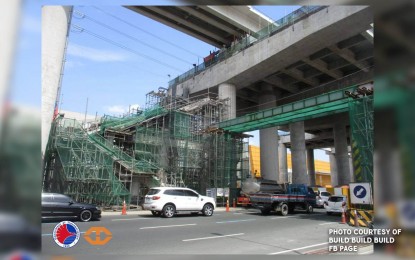
MANILA – Key cabinet officials said the Duterte administration will continue to pursue infrastructure and tax reforms in a bid to ensure the domestic economy's sustained growth and alleviate poverty.
This was stressed by Finance Secretary Carlos Dominguez III on Monday, in time for President Rodrigo R. Duterte’s fourth State of the Nation Address (SONA).
Aside from the tax reform and the “Build, Build, Build” programs, Dominguez said the digitalization of the Bureau of the Internal Revenue (BIR) and Bureau of Customs’ (BOC) systems and operationalization of the tax academy will be prioritized.
He told journalists that these programs “are on track and will be delivered as scheduled.”
He explained that, for one, the government was able to exceed infrastructure investments beyond 5 percent of gross domestic product (GDP).
Government data show that investments in infrastructure hit 6.3 percent in 2017, higher than the 4.5 percent in the previous year.
The current government vows to increase infrastructure investments to reach 7 percent of domestic output by 2022, noting that providing the necessary infrastructure will sustain the robust growth of the economy. It has set an annual infrastructure investments of at least PHP1 trillion.
“We have, for the first time in history, exceeded 5 percent of GDP in spending on infrastructure and we are on track to achieve 7 percent of GDP in three years’ time,” Dominguez said.
The Finance chief said they will continue to push for the approval of the remaining tax reform proposals like the Motor Vehicle User Charge (MVUC), the lifting of bank secrecy law, the automatic exchange of tax information, the reduction of corporate income tax rates, rationalization of fiscal incentives, additional increase in excise tax for alcohol products to have the needed funding for the Universal Health Care (UHC) program.
Also, the broadening of the tax base of property taxes of the national and local governments and rationalization of capital income taxes.
Dominguez said they will also pursue economic reforms targeted to boost foreign direct investments and jobs, improve the implementation of the National ID system, ease of doing business, rice tariffication, and the productivity of agriculture, including distribution of individual titles to land reform beneficiaries.
He said all these measures “will help us ensure faster GDP growth, lower poverty, and open more opportunities to all law-abiding Filipinos.”
“They will also complete the President’s promise in the zero to ten-point socioeconomic agenda,” he said.
The Finance chief, meanwhile, admitted that challenges remain in achieving these reform programs.
On top of the list is ensuring that the infrastructure and social economic reforms will have adequate funding, he said.
“We’ve worked hard with Congress to pass TRAIN and have been continuously working with them to complete the passage of the succeeding packages of the comprehensive tax reform program. Any reform worth pursuing is difficult. As they say, change has its enemies and counter-reform never sleeps,” he said.
The Tax Reform for Acceleration and Inclusion (TRAIN) Act, the first package of the tax reform program, was signed into law in December 2017 and took effect the following year.
It cut workers’ income tax rates and made their first PHP250,000 annual income tax free.
Dominguez pointed out that “the reforms we are undertaking are for the greatest good of the greatest number.”
He said these reforms “made possible unprecedented investments in infrastructure and human capital.”
He cited that rice trade liberalization “will benefit millions of consumers and farmers.”
The Rice Tariffication Act, which he earlier said is “one of the most important legislative achievements of the 17th Congress”, took effect last March.
“These reforms benefit overwhelming majority of the Filipino people, and that is why we fought for these reforms with conviction. We know the right course of action, we have forged alliances with like-minded reformers from various sectors, and we actively explain the benefits of reform to the Filipino people,” he said.
Dominguez pointed out that what economic managers learned from their tax reform bids in the first three years of the current administration is that “reforms have to be well-designed from a technical perspective, patiently consulted with and communicated to various interest groups, and actively supported by powerful coalitions.”
“Implementing these reforms similarly rests on well-designed implementing mechanisms and robust communications and engagement strategies,” he said, thus, the bid to continuously coordinate with other government agencies and stakeholders since “this establishes ownership and accountability among a diverse set of actors, and sustains support, sometimes through constructive criticism from stakeholders.”
He said that “successful implementation of particular reforms also depends on the passage and implementation of complimentary reforms.”
“For tax policy reform, this includes strong tax administration and social protection reforms. For rice liberalization, these reforms include better delivery of farm support services, technology adoption, access to credit, and training. For these complimentary reforms, too, reform design, communication, and engagement are crucial,” he added. (PNA)
